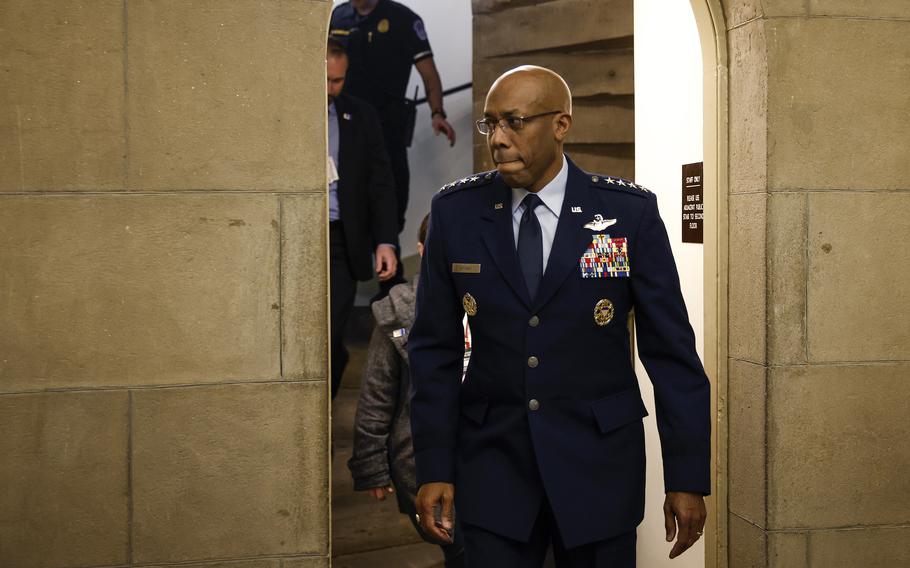
Chairman of the Joint Chiefs of Staff Gen. Charles “CQ” Brown leaves the office of U.S. Speaker of the House Mike Johnson, R-La., in the U.S. Capitol Building on Nov. 1, 2023, in Washington. (Anna Moneymaker, Getty Images/TNS)
(Tribune News Service) — Gen. Charles “CQ” Brown, chairman of the U.S. Joint Chiefs, spoke with his Chinese counterpart for the first time in a call that the Biden administration billed as a further sign that ties between the two countries’ militaries may be getting back to normal.
The Defense Department said that the video call between Brown and Liu Zhenli, held Thursday morning Washington time, included discussion of working together to avoid miscalculations and maintaining open lines of communication.
A senior U.S. military official, who briefed reporters on condition of anonymity, credited a meeting between President Joe Biden and President Xi Jinping in California in November for opening the way to restore contacts that had been severed since then-House Speaker Nancy Pelosi’s visit to Taiwan in August.
The official said future steps include plans to hold talks on defense policy in January and a round of maritime consultations in the spring.
This would be the first time the two sides have held the defense policy coordination talks, intended to be an annual dialog, since Beijing canceled them following Pelosi’s trip. It would also be the first in-person edition since before the COVID-19 pandemic.
A summary of the call from the Chinese defense ministry stressed that Washington needs to understand and respect Beijing’s interests and concerns — including its territorial claims in the South China Sea. The ministry also said the status of Taiwan is an internal matter and that U.S. interference won’t be tolerated.
The U.S. and China had previously accused each other of provocative or unprofessional actions during repeated encounters by military craft in and around the South China Sea. But on Monday, Admiral John Aquilino, head of U.S. Indo-Pacific Command, said China has stopped “dangerous” military actions in the weeks since the Biden-Xi meeting.
Brown said Dec. 2 that he was “standing by” for an opportunity to speak with Liu, touting the importance of maintaining communications with adversaries “to prevent miscalculation.” The last time a Joint Chiefs chairman spoke with his Chinese counterpart was in July 2022, according to U.S. officials.
They said conversations with Beijing are ongoing about future contacts among senior U.S. and Chinese officials, but didn’t provide timelines for any future conversations involving Defense Secretary Lloyd Austin or others. The Chinese government hasn’t yet named a new minister of national defense following the October ouster of Li Shangfu; the U.S. officials suggested this was expected to occur in March.
With assistance from Jacob Gu.
©2023 Bloomberg L.P.
Visit bloomberg.com.
Distributed by Tribune Content Agency, LLC.